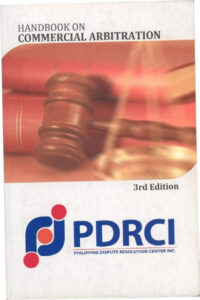 At its meeting on September 15, 2014, the Board of Trustees of the Philippine Dispute Resolution Center, Inc. (PDRCI) approved the revised PDRCI Rules of Arbitration and the Guidelines on Fees, which will become effective on January 1, 2015.
At its meeting on September 15, 2014, the Board of Trustees of the Philippine Dispute Resolution Center, Inc. (PDRCI) approved the revised PDRCI Rules of Arbitration and the Guidelines on Fees, which will become effective on January 1, 2015.
The revisions were introduced at the initiative of President Gregorio Navarro and Treasurer Donemark Calimon to make the Arbitration Rules consistent with the 2010 UNCITRAL Arbitration Rules, which became effective on August 15, 2010, the adoption of the International Bar Association Guidelines on Party Representation on May 25, 2013, and recent changes to their rules adopted by the International Chamber of Commerce, Hong Kong International Arbitration Centre, and the Singapore International Arbitration Centre.
The criteria used by the Rules Revision Committee were:
- Ease of use. The new Rules should be user friendly, especially to parties and counsel who are new to commercial arbitration.
- Competitiveness. It should provide a simplified and inexpensive procedure as an alternative to litigation and to costly arbitration offered by other international providers.
- Compatibility. It should be consistent with the UNCITRAL Model Law, UNCITRAL Arbitration Rules, and the rules of international arbitration centers.
For ease of use, the new Rules are
short and simple. All the paragraphs are numbered, unlike before when some rules extended into several unnumbered paragraphs. The rules are also cross-referenced for consistency. In addition, explanatory notes and a practice guide will be introduced next year to help parties, tribunals and the courts in applying the rules. To enhance competitiveness, the new Rules now limit opportunities for delays by recalcitrant parties. A uniform 30-day period is set to communicate to PDRCI (to respond, appoint arbitrator, file request, etc.), except for challenges (15 days to challenge, 30 days to decide), correction of award (45 days), and additional award (60 days). The maximum period to communicate written submissions is 45 days, subject to extension but only if justified. The periods are designed to respond to the need to resolve commercial disputes quickly but not hastily.
A provisional fee or advance on cost will be paid upon submission of the Notice of Arbitration or Counterclaim (or any other claim) and before PDRCI takes any action on the Notice or Counterclaim (or any other claim). Cross-claims and third-party claims are now allowed as “any other claims for the purpose of set-off,” as are consolidation of arbitrations, joinder of parties, and claims between multiple parties.
For the first time, more than three arbitrators may be appointed, “taking into consideration the circumstances of the case.” In addition, emergency arbitrators may be appointed to hear and resolve petitions for interim measures of protection such as injunction or replevin within 20 days.
To ensure the high quality of the tribunal and to avoid delays, the arbitrators are subject to confirmation by PDRCI. PDRCI’s decision on any challenge is also final, avoiding any further referral to the tribunal. The parties may likewise avail of expedited or summary procedure for claims not exceeding P25M, or if the parties agree, or in cases of exceptional urgency.
The new Rules are consistent with Rep. Act 876 (Arbitration Law), Rep. Act 9285 (Alternative Dispute Resolution Act of 2004), and its implementing rules and regulations. It adopts the standard of “equal treatment of parties” and “reasonable opportunity” to present one’s case used under the 2010 UNCITRAL Arbitra- tion Rules, doing away with the standard of “full opportunity” to present one’s case under the 1985 UNCITRAL Model Law, as revised in 2006.
The Guidelines on Fees were also revised to include the assessment of provisional advances and the recognition of taxes due on the arbitrator’s fees.
The Arbitration Rules Revision Committee is composed of Atty. Calimon, Chairman, with the following as members: Secretary General Roberto Dio, President Emeritus Custodio Parlade, and Trustees Ricardo Ongkiko and Arthur Autea.
The ADR Act of 2004: A decade of changes and challenges
 In Part One, the author traced the history of the law and PDRCI’s role in its enactment. In this part, he explores the early years of the law, the formulation of its implementing rules and regulations and the Special ADR Rules, and the growing acceptance of arbitration.
In Part One, the author traced the history of the law and PDRCI’s role in its enactment. In this part, he explores the early years of the law, the formulation of its implementing rules and regulations and the Special ADR Rules, and the growing acceptance of arbitration.
Implementing rules and regulations
Section 52 of the ADR Act directed the Secretary of the Philippine Department of Justice (DOJ) to convene a committee that would formulate the law’s implementing rules and regulations (IRR).
Under the DOJ’s auspices, the following were appointed to draft the law’s IRR: DOJ Undersecretary Jose Vicente B. Salazar as Department of Justice, Department of Trade and Industry Undersecretary Zenaida N. Maglaya, Department of the Interior and Local Government’s Director Nelda D. Leda, Atty. Victor Lazatin as a representative of the Office of the President of the Integrated Bar of the Philippines, Dean Custodio Parlade as a representative of the arbitrators, and Atty. Alfredo F. Tadiar and Prof. Anabelle Abaya as representatives of the mediators.
Pursuant to the ADR Act, they must submit the IRR to the Joint Congressional Oversight Committee for review and approval.
According to Atty. Lazatin, the draft was completed by the end of 2004. “However, at around that time, the Supreme Court had ruled [in another case, Macalintal v. Commission on Elections 405 SCRA 614 (2003)] that ‘rule-making’ was an executive power and that submission of the IRR for review and approval to the Joint Congressional Oversight Committee was illegal.”
As a result, the promulgation of the IRR was delayed. Finally, the IRR was approved by Acting DOJ Secretary Agnes V.S.T. Devanadera on December 4, 2009.
ADR Act’s birth pangs
For Dean Parlade, the crucial task after the ADR Act’s enactment was enhancing the awareness of judges and lawyers about the new law and its application, as well as convincing them of the advantages of arbitration as a mode of dispute settlement. “The litigation lawyers also found difficulty adjusting to the shift in procedure from litigation to arbitration and often misapply the provisions of the Rules of Court to arbitration,” he said.
Ten years, however, are not enough to change the mindset of some lawyers. “The process is continuing to get lawyers to know that there are practical and important differences of arbitration from litigation,” Dean Parlade added.
Special ADR Rules
The passage of the ADR Act prompted the Philippine Supreme Court to promulgate and approve the Special Rules of Court on Alternative Dispute Resolution, or the Special ADR Rules, on September 1, 2009.
The Special ADR Rules governs the procedures in instances where court intervention is permitted in ADR proceedings. “These procedural rules sought to set order and uniformity in the way courts handle and resolve disputes involving ADR proceedings or incidents,” Atty. Lazatin said.
Dean Parlade shared the same observation. He noted that lower courts are now referring the parties to arbitration in compliance with their arbitration agreements, and appellate courts [the Philippines’ Court of Appeals and Supreme Court] almost always now apply the Special ADR Rules when ADR-related issues are raised.
Growing acceptance of arbitration
Atty. Lazatin said that the ADR Act has achieved its aims: “The Act has clarified a lot of details, both substantive (for example, confidentiality rules) and procedural.” He added that with respect to international arbitration, the Philippine law became aligned with the global standards set forth in the Model Law.
Atty. Lazatin shared that in one arbitration he handled, he was able to present witnesses domiciled abroad, who otherwise could not come to the Philippines, through video conferencing. “The rigidity in court proceedings would have not allowed that,” he added.
Dean Parlade noted that during the earlier years of Construction Industry Arbitration Commission (CIAC) arbitration, a foreign party would usually object to submitting its dispute with a Philippine party to CIAC.
With the ADR Act, Dean Parlade observed that that does not happen anymore, unless there is a valid ground for dismissal of the claim. “There have now been a good number of cases where the construction agreement with foreign parties specifically provides for CIAC arbitration or they commence the arbitration as claimants,” he said.
Atty. Manuel Bautista, Jr., a senior consultant of Herbert Smith Freehills Hong Kong who specializes in international arbitration, agreed that the ADR Act and the Special ADR Rules are “significant steps for enhancing the viability of the Philippines as a center for arbitration.”
According to him, “[i]t is now clear that foreign lawyers are allowed to represent parties in arbitrations seated in the Philippines even when the governing law of the dispute is Philippine law” and “parties may freely choose an arbitrator without regard to nationality even when the substantive law of the dispute is Philippine law.”
Data from PDRCI show that from 2000 to 2013, 53 domestic and 14 international arbitration cases were referred to it for resolution. Thirtythree of those cases were settled.
